It’s a common sight to see someone snap the filter off a cigarette before smoking it. Some smokers believe that this method enhances their smoking experience, while others do it for practical reasons.
However, experts warn about the risks associated with this practice. Here’s a closer look at what happens when smokers snap the filter off a cigarette:.
1. Increased Tar and Nicotine Intake
When smokers snap the filter off a cigarette, they remove the barrier that’s designed to filter out harmful chemicals from the tobacco smoke.
As a result, they inhale higher levels of tar and nicotine, which are associated with lung cancer, heart disease, and other health problems. Research has shown that smokers who snap the filter off their cigarettes have an increased risk of developing these conditions.
2. Harsher Smoke
Without the filter, cigarette smoke can be harsher and more irritating to the throat and lungs. Smokers who snap the filter off their cigarettes may experience coughing, wheezing, throat irritation, and other respiratory symptoms.
This can make smoking less enjoyable and more uncomfortable.
3. Negative Impact on Others
Smokers who smoke without filters not only harm themselves but also those around them. Secondhand smoke is a serious health hazard, especially for children, pregnant women, and people with respiratory conditions.
When smokers snap the filter off their cigarettes, they release higher levels of harmful chemicals into the air, which can have negative effects on the health of others.
4. Increased Addiction
When smokers snap the filter off their cigarettes, they increase their exposure to nicotine. Nicotine is a highly addictive substance that can make it harder for smokers to quit.
In fact, research has shown that smokers who use cigarettes without filters tend to smoke more and have a harder time quitting than those who smoke filtered cigarettes.
5. Risk of Fire
Smoking without filters can also increase the risk of fire. Filters are designed to help prevent cigarettes from igniting accidentally.
When smokers remove the filter, they increase the risk of the cigarette catching fire and causing a potentially dangerous situation.
6. Legal Consequences
It’s worth noting that smoking without filters can have legal consequences. In some states, it’s illegal to remove or alter a cigarette filter or sell cigarettes without a filter.
Violating these laws can result in fines, jail time, or other legal penalties.
7. Lack of Protection
Filters are designed to protect smokers from harmful chemicals in tobacco smoke. Removing the filter exposes smokers to higher levels of these chemicals and increases their risk of developing health problems.
Smokers who snap the filter off their cigarettes are essentially choosing to forego this protection, which can have serious consequences for their health in the long run.
8. Alternative Smoking Methods
For smokers who are looking for an alternative to filtered cigarettes, there are safer options available. E-cigarettes, for example, don’t contain tobacco or produce smoke, making them a safer alternative to traditional cigarettes.
Nicotine patches, gum, or lozenges are also effective for reducing nicotine cravings and can help smokers quit smoking altogether.
9. Increased Cost
Smokers who remove the filter from a cigarette may not realize that they’re also wasting the tobacco in the process.
Without the filter, tobacco burns faster, meaning that smokers will go through their cigarettes more quickly and need to buy more to keep up. Over time, this can add up to a significant increase in cost, as well as health risks.
10. Overall Health Risks
Smoking is a dangerous habit that’s associated with many health risks, including cancer, heart disease, and lung disease. Removing the filter from a cigarette only increases these risks.
It’s important for smokers to be aware of the dangers associated with their habit and to take steps to quit smoking altogether.






























